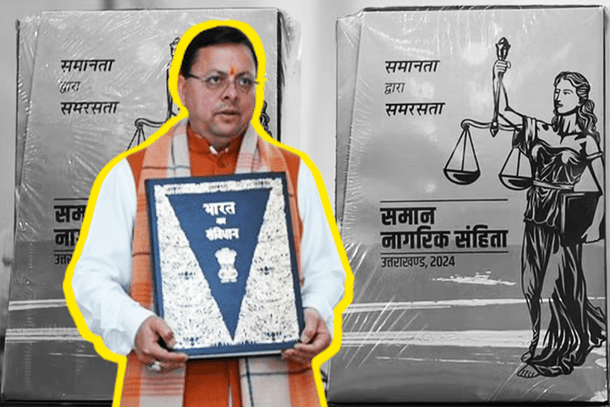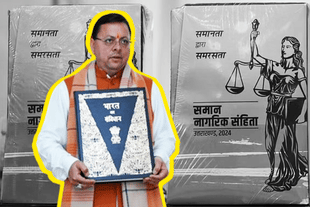Politics
Uttarakhand UCC Rules Expected To Deter 'Love Jihad,' But Devil May Lie In The Details And Implementation
Abhishek Kumar
Feb 03, 2025, 05:23 PM | Updated 05:23 PM IST
Save & read from anywhere!
Bookmark stories for easy access on any device or the Swarajya app.


Uttarakhand’s Pushkar Singh Dhami government recently launched a portal and introduced rules for the registration of live-in relationships.
A live-in relationship is a domestic arrangement in which a couple lives together in a committed partnership without formal marriage. In India, it is legally recognised and increasingly accepted, though societal views vary.
The Uttarakhand portal is available in 23 languages, including South Indian languages, as well as Marathi, Manipuri, Sindhi, and Odia, among others.
The wide range of languages indicates that the ambit extends well beyond the ordinary residents of Uttarakhand.
Couples seeking to register must complete a 16-page form and provide various certificates. In fact, the word “certificate” appears 157 times in the 139-page document.
These rules come almost a year after Uttarakhand became the first state in India to follow the constitutional directive of adopting a uniform civil code (UCC).
Notably, in recognition of their customs, the Scheduled Tribes have been excluded from both the UCC and live-in relationship regulations.
Registration of Live-in Relationships
Section 378 of the state's UCC makes it mandatory for partners to submit a statement declaring their live-in relationship to the authorised registrar.
The registrar must be notified within a month of the start of the relationship.
The primary objective of this provision is to provide social protection to partners facing domestic violence in a live-in arrangement.
After reviewing 2.33 lakh written feedback responses and engaging with 60,000 people, the government-appointed panel found that citizens sought action against crimes occurring in live-in relationships.
The registration process includes verification and background checks to deter partners with malicious intent, as confirmed by a state government official who spoke to The Indian Express.
It also aims to prevent fraud, such as one partner lying about their relationship status or coercing the other into a relationship through misrepresentation and other unethical means.
Rules requiring disclosure of previous relationships, changes in address, and updated contact details serve as additional safeguards.
Checks on 'Love Jihad'?
This is one of the less discussed aspects of the new rules. If either partner (or both) changes their religion, the official web portal must be updated within 10 days.
In 2023, a Mahapanchayat was planned in Uttarkashi to formulate strategies against 'love jihad,' but the government halted it. However, Chief Minister Dhami has been vocal about cases of conversion through misrepresentation in spousal relationships and has directed the police to take stern action. (In September 2024, Uttarakhand Police began a certification drive to prevent demographic changes.)
While registration will make it easier for authorities to detect potential fraudulent conversions in advance, the requirement to update the portal ensures that bad-faith actors cannot manipulate their partners' religious identity.
Since minor girls are the primary targets of coercive conversion strategies, the requirement to submit parental details for minor children enables the registrar to investigate and reject applications in such cases.
Legal Recognition of the Child
Section 379 of the Uttarakhand UCC states that a child born out of a live-in relationship will be considered legitimate. Legitimacy for such children was established by the Supreme Court in the Bharata Matha and Vidyadhari cases. By incorporating this provision into the UCC, inheritance and other rights of children have now been codified.
To ensure transparency, rules require partners to update information within 30 days of obtaining a birth or adoption certificate for the child. This applies even after the termination of a live-in relationship, provided that the woman was pregnant when the termination process began.
Maintenance for Deserted Partners
Section 388 of the UCC bill provides for maintenance for women deserted by their live-in partners. In terms of maintenance, the bill recognises female live-in partners on par with wives in formal marriages.
The bill states that the provisions in Chapter 5 of Part 1 of the UCC Act will apply — this chapter provides for permanent alimony and maintenance for spouses.
The only distinction is that these provisions benefit deserted women but not men in live-in relationships.
Definition of Residence
Residents of Uttarakhand, regardless of where they live, must register their relationships.
There are three key points of contention with this provision.
First, it mandates that someone from another state must register their live-in relationship in Uttarakhand simply because they work there.
This could be seen as an infringement on the personal space of individuals whose home state does not require such registration.
Second, Section 3(1)(n) of the bill defines 'resident' so broadly that even permanent central or state government employees in Uttarakhand qualify as residents.
Thus, a resident of another state working for an Uttarakhand government undertaking would also fall under this definition of 'resident.'
Moreover, individuals living in Uttarakhand for over a year or those eligible for permanent residency also fall within this definition.
Third, the rules require individuals from other states living in Uttarakhand for work to register their live-in relationships.
Although the registration process is online, bureaucratic red tape could lead to unnecessary harassment over minor paperwork errors.
Conflict With Local Custom or Practice
Section 380 lays down the conditions for rejecting a live-in registration.
One condition for rejection states that if the custom and practice of one of the partners do not permit it, the registration will be denied, provided that the custom and practice are not against public policy and morality. The ambiguous definitions of 'morality' and 'public policy' make this provision prone to litigation.
Prohibitory Relationships
Schedule 1 of the UCC Act lists 74 relationships as prohibitory for marriage and live-in relationships. However, some of these relationships are not prohibited in certain communities.
In some religious communities, men in prohibited relationships (as per the UCC Act) are assigned to vulnerable women under the guise of social protection.
The UCC is meant to eliminate such practices, and the Act makes arrangements for this.
However, the prescribed rules introduce an authority called a "religious leader," defined as “a priest of the place of worship of that community or an office bearer of the religious body pertaining to that community.”
This religious authority, whether a maulvi, church priest, or pujari, has the power to approve such relationships. If both partners fall under a prohibited relationship category, they must furnish a signed letter from a religious leader for their relationship to be legally recognised.
This effectively undermines the essence of the UCC, which aims to establish uniform personal laws.
Issues of Privacy
Certain provisions in Section 381 could be deemed an unnecessary intrusion into private affairs. Under sub-section (2), the registrar is required to conduct a summary inquiry before registration.
Section 381(3) allows the registrar to summon the couple and “other persons” for inquiry.
The term "other persons" is undefined in the Act and could refer to family members, neighbours, public authorities, or others, placing excessive power in the registrar’s hands.
Additionally, sharing live-in partners' private information without consent contradicts the Right to Privacy, as upheld by the apex court in the Puttaswamy judgement.
Non-Registration as a Criminal Offence
Section 387 of the UCC makes failure to submit a statement to the registrar a criminal offence, punishable by up to three months' imprisonment.
Similarly, failing to submit a live-in relationship certificate is punishable by up to six months' imprisonment.
While this provision may deter unscrupulous individuals, criminalising non-registration creates excessive regulatory oversight in personal spaces.
Too Many Certificates?
While requiring identity and contact details for security reasons is reasonable, exhaustive documentation of past relationships makes the process cumbersome.
For the UCC to serve its purpose, it must evolve to simplify procedural hurdles and ensure that its provisions do not inadvertently perpetuate regressive practices or infringe upon fundamental rights.
Abhishek is Staff Writer at Swarajya.





